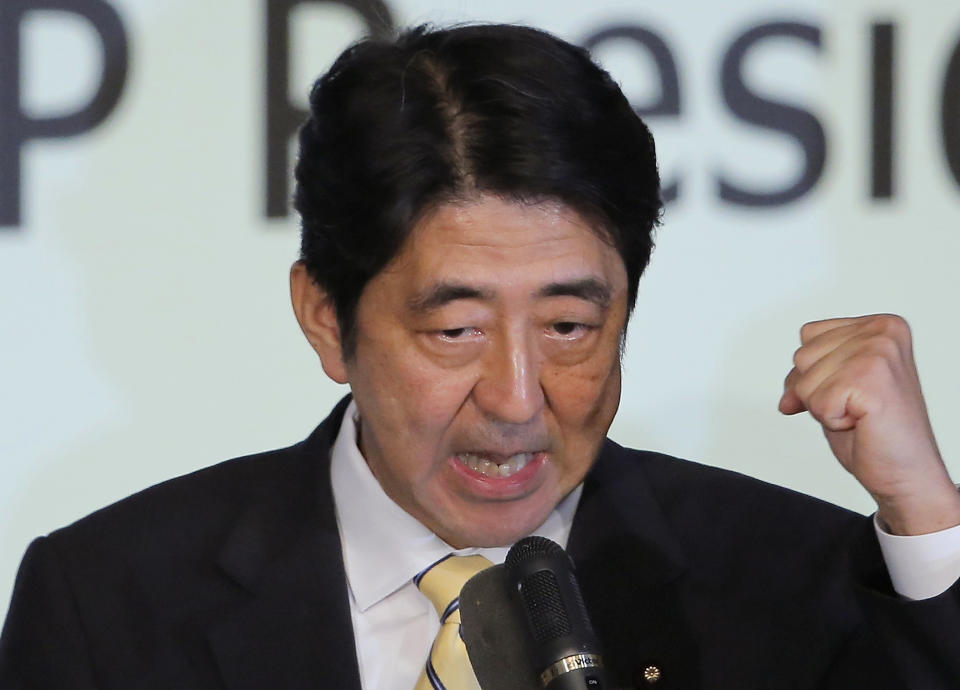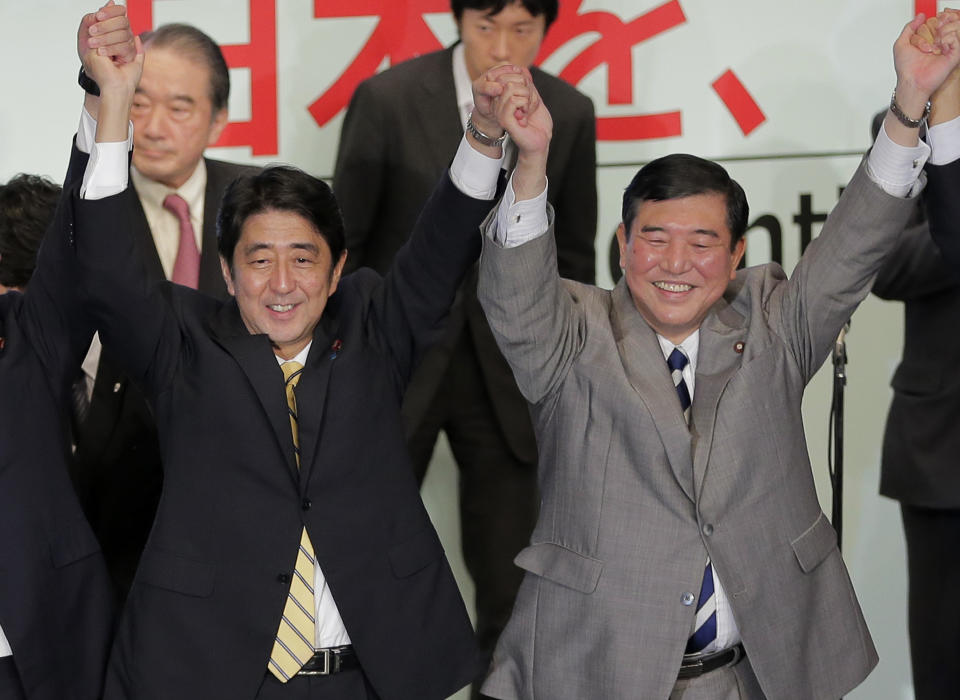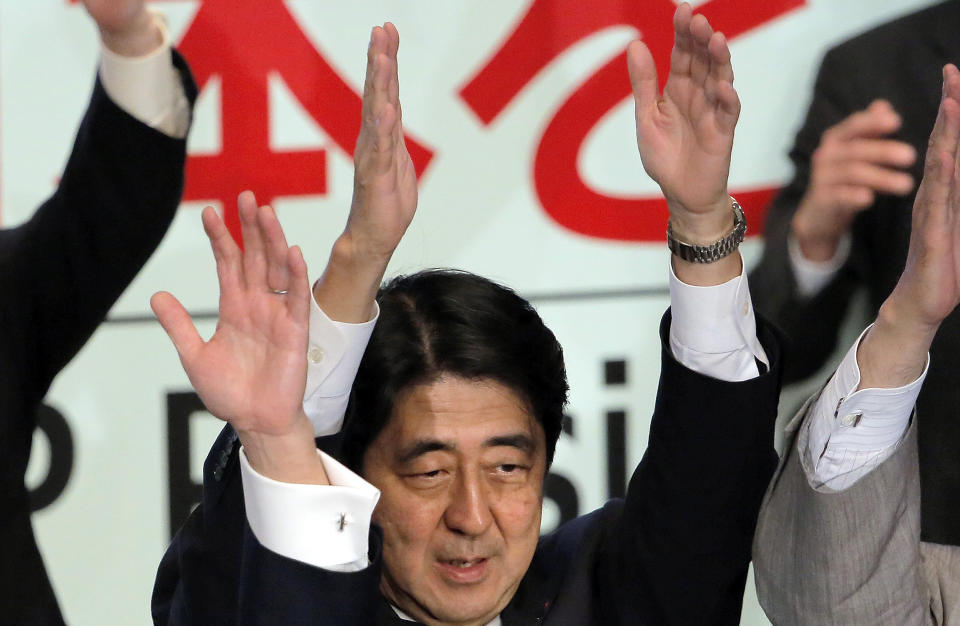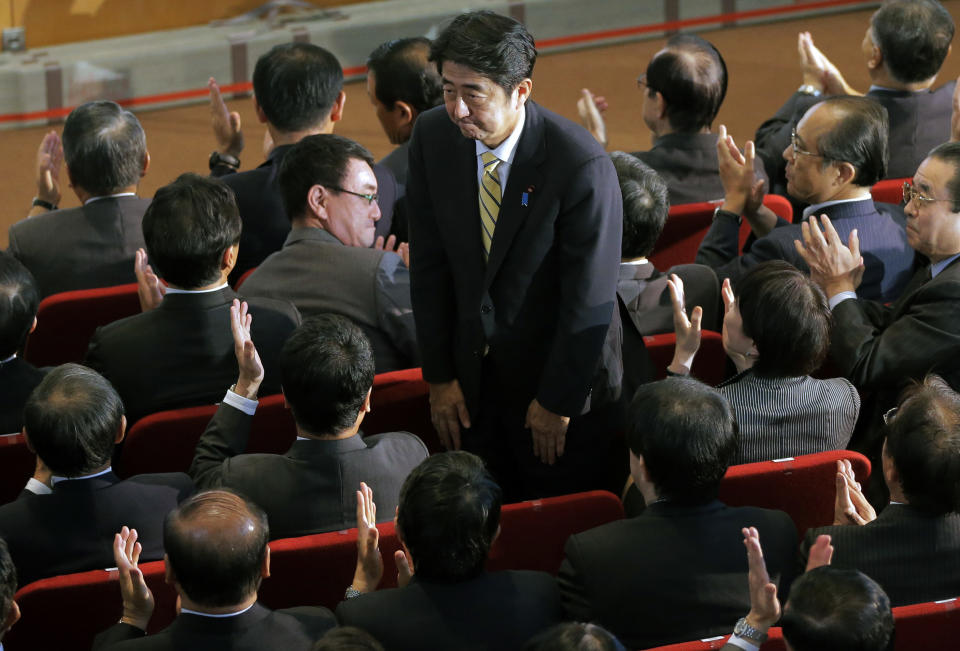Ex-PM Abe wins vote to lead Japan opposition party
TOKYO (AP) — Former Prime Minister Shinzo Abe, a staunch nationalist who walked away as Japan's leader five years ago, won an election Wednesday to lead Japan's main opposition party, making it likely he will return to power if the unpopular government goes down in promised elections.
Abe, who was prime minister for a year before abruptly resigning in 2007 with an intestinal ailment, has taken a tough stance against China in a territorial dispute over a cluster of uninhabited islands in the East China Sea controlled by Japan but also claimed by China and Taiwan. He also promised to work to revive Japan's long-stagnant economy and renew a sense of national pride.
"Our land and seas are threatened, and the economy has deteriorated after years of deflation. We must break free from this difficult situation and make a strong Japan, and that is my mission," he said at a press conference after the vote.
Abe came from behind to defeat ex-defense chief Shigeru Ishiba in the vote of Liberal Democratic Party lawmakers. Abe finished second to Ishiba in the first round of voting, which included three other candidates, but beat him 108-89 in the head-to-head runoff.
Abe, 58, will most likely become prime minister if the conservative LDP wins the most seats in the next election. Recent polls indicate it would, though it may need to form a coalition with other parties to govern.
Prime Minister Yoshihiko Noda has said he plans to call elections soon, but has given no timeframe, and has lately suggested he plans to stay in office. Elections must be called by next summer.
Abe thanked party members for giving him another chance. He says he is now in good health.
"I'm still responsible for causing all of you trouble with my sudden resignation as prime minister," he said. "I will do my utmost to rise back to power with all of you."
But analysts say Abe's triumph could end up hurting the LDP because he was the most nationalistic of the five candidates, and because voters will remember his resignation.
"For ordinary Japanese who are not ideologically leaning one way or another, I think they'll say, 'Really? That's the guy who quit and left Japan in limbo,'" said Koichi Nakano, a professor of political science at Sophia University in Tokyo.
Nakano added that already strained relations with China could worsen if Abe becomes prime minister. "He brings as baggage all kind of things that are difficult to deal with for the Chinese leaders," he said.
Abe's previous 2006-2007 tenure as prime minister was marked by a nationalistic agenda. He urged a revision of Japan's pacifist constitution, pressed for patriotic education, upgraded the defense agency to ministry status and pushed for Japan to have a greater international peacekeeping role.
He tried to improve relations with China that had frozen under his predecessor Junichiro Koizumi, after Koizumi repeatedly visited Yasukuni Shrine, which honors Japan's war dead, including executed war criminals. But Abe also upset China and South Korea with attempts to revise Japan's wartime history, and now says he regrets never visiting the shrine as prime minister himself.
He said there was no proof its military had coerced Korean, Chinese and other women into prostitution in military brothels during World War II. He later apologized, but lately he has been suggesting that a landmark 1993 apology for sex slavery may need revising.
The LDP is a conservative, pro-business party that led Japan nearly continuously since 1955 until it was defeated by the Democratic Party of Japan, which swept to power in 2009 amid high hopes for change.
Voters are disappointed in the DPJ, and polls give the LDP a modest advantage, suggesting that the LDP would win the most seats in an imminent election, but not a majority. Many voters, however, remain undecided.
Left out of the party run-off was Nobuteru Ishihara, the son of outspoken nationalistic Tokyo Gov. Shintaro Ishihara, who set off Japan's territorial dispute by proposing to buy and develop the tiny disputed East China Sea islands that Japan calls Senkaku and China calls Diaoyu.
To thwart that plan, Noda's government bought three of the islands from their private Japanese owners two weeks ago. That brought rebukes from Beijing and Taipei, as well as anti-Japanese demonstrations and riots in China that damaged Japanese-owned factories.
After the riots, Abe said China didn't deserve to be a part of the international community if it couldn't protect Japanese citizens in China.
Abe suggested that as far as the LDP was concerned, there is no territorial dispute over the islands: They unquestionably belong to Japan.
"In response to the various movements by China around the Senkakus, I will clearly show my intention to take a firm action to protect the islands and the territorial waters around them," he said Wednesday.
Abe also accused the DPJ for weakening Japan's security alliance with the U.S., and promised to repair it.
Noda had said he would call elections "soon" in exchange for the LDP's support in passing legislation to double Japan's 5 percent sales tax earlier this year. But Noda has given no date for the elections, and lately he has suggested that that agreement should be revised in view of the LDP's support of a nonbinding censure motion against him in the opposition-controlled upper house.
Noda recently indicated he wants to stay on to tackle Japan's serious problems, including recovering from last year's tsunami and nuclear disaster and reforming the social security system as Japan's population ages.
___
Associated Press writer Mari Yamaguchi contributed to this report.




